by Lilly Lewin,
Wine, Cheese, Chocolate and Jesus! This has been our invitation to thinplace for the past few years. My husband Rob and I have hosted a thinplace gathering in our home in Cincinnati, Napa Valley and now here in Nashville. thinplaceNASHVILLE happens on Sunday nights. We start with dinner, sometimes a potluck, wine and cheese, and always chocolate. After dinner, we move from the table to the living room and I pass out clipboards, copies of the scripture and any art supplies that folks want to use. The second part of our gathering is a time for journaling and art based off a passage of scripture. We open by praying a psalm together and then doing a lectio divina on a passage usually from one of the Gospels.
We listen to a passage in two translations, one being The Message. After listening to the passage and allowing the Holy Spirit to highlight something for us, we have 30-45 minutes to just be with the passage and be with God. I write several questions to consider while journaling and I have art supplies if people want to create a response to the passage. During this time, there is a peaceful instrumental playlist playing as a backdrop. Before we begin, I always remind us that there is no wrong way to do this process.
Some one might be inspired by the psalm, rather that the gospel and that’s fine. The Holy Spirit might take someone in a totally different direction than either the psalm or the gospel passage and that’s ok too. After the journaling/art time is completed we open up the space for sharing but there is no requirement to do so. During the journaling people ponder the questions, write poems, create drawings or just sit with the text. Some people use their phones to find out more about the people or places in the passage or dig a little deeper in another translation of the Bible. When everyone who wants to share has had the opportunity, we close with an experiential element that ties the story to our real lives, often it is something that we can take away to remind us of the passage or remind us to pray. I actually call these symbols and/or responses “Take Aways.”
This past week we used the lectionary passage from Ezekiel 37:1-14 as our lectio/ listening passage and had the gospel passage from John 11:1-45 the story of the raising of Lazarus as something that could be read during the journaling time. Each story focuses on bringing life back from death. The dry bones in Ezekiel need the breath of God breathed back into them. And in the story of Lazarus, Jesus commands his friend to come forth from the tomb and he does, still wrapped in his burial cloths. Both stories also remind us that we too need resurrection and to be unbound from our grave clothes.
As our closing, we passed around strips of muslin and a bowl of mixed spices: cinnamon, cloves and allspice. Each person took a strip of muslin and rolled it in the spices and then made a bracelet from the muslin strip. We are wearing these bracelets as a reminder of our need to be set free and our own need for new life and resurrection. They also remind us of the burial of Jesus and we will cut them off on Easter Sunday as a symbol of resurrection.
The grave cloth bracelet is a great take away, experiential response that you can do on your own, with your family, with your roommates, your small group or even your entire church community on Good Friday. You might even have some people over for dinner sometime during the week and talk about where they might be feeling “dead” or in need of new life. All you need are enough muslin strips (cut 10-12 inches long so they can be easily tied) some small scissors for trimming the bracelets, a bowl with a mixture of cinnamon, all spice and ground cloves. The bowl needs to be big enough to roll the strip of muslin in easily.
The grave cloth bracelet response is originally from Station 14 in my Experiential Stations of the Cross that you can download at freerangeworship.com.
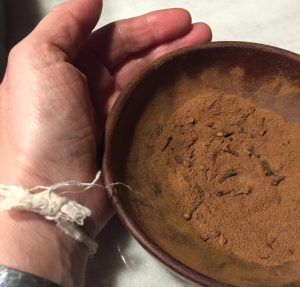
Jesus is Laid in the Tomb
This all happened on Friday, the day of preparation, the day before the Sabbath. As evening approached, Joseph of Arimathea took a risk and went to Pilate and asked for Jesus’ body. (Joseph was an honored member of the high council, and he was waiting for the Kingdom of God to come.) Pilate couldn’t believe that Jesus was already dead, so he called for the Roman officer and asked if he had died yet. The officer confirmed that Jesus was dead, so Pilate told Joseph he could have the body. Joseph bought a long sheet of linen cloth. Then he took Jesus’ body down from the cross, wrapped it in the cloth, and laid it in a tomb that had been carved out of the rock. Then he rolled a stone in front of the entrance. Mary Magdalene and Mary the mother of Joseph saw where Jesus’ body was laid.
Mark 15:42-47
Take a strip of cloth and roll it in the spices. Now Make a bracelet with the cloth.
Allow the smell of the spices and the strip of cloth to remind you of Jesus’ death and burial.
Wear it until Easter and then cut off the bracelet and as symbol of resurrection. Or you might wear it longer and Cut it off when you feel you’ve experienced resurrection in the next few weeks.
Sitting in my home office, I’m gazing out the window at my garden sanctuary it looks a total mess. I just haven’t had the time to finish cleaning up from the winter. It’s worse this spring because I decided to only minimally remove plants from last summer/fall, choosing instead to leave them for the birds and various animals to forage over the winter months.
 In the midst of the mess emerge new plants from seed left behind and scattered by my animal friends, my gardening companions. It’s fun to see just what emerges where… and when. Gazing further out I see the top of Mt. Defiance still covered with snow. Those native to this valley remind us that, if there’s still snow on Mt. Defiance, then it’s still too early to plant seeds. Yet wandering my garden I see little signs of defiance everywhere, flowers and vegetables naturally emerging after a long, cold winter.
In the midst of the mess emerge new plants from seed left behind and scattered by my animal friends, my gardening companions. It’s fun to see just what emerges where… and when. Gazing further out I see the top of Mt. Defiance still covered with snow. Those native to this valley remind us that, if there’s still snow on Mt. Defiance, then it’s still too early to plant seeds. Yet wandering my garden I see little signs of defiance everywhere, flowers and vegetables naturally emerging after a long, cold winter.
In the book of Ecclesiastes we’re reminded that there is a season for everything. Ancient wisdom can provide general guidelines to some of those seasons, like planting, but each year brings a new interpretation of the seasons, told first by new plants bursting forth from their seed-tombs. This year I am surprised by the contrast between the amount of snow still on Mt. Defiance and the new life springing forth all over my garden. And so it is with resurrection; it catches us off guard, bringing both joy and hope. (And we’re certainly ready for that after the winter we’ve had!).
Palm Sunday and the beginning of Holy Week is just three days away. Lent is drawing to a close as hearts turn first to the cross, and then to resurrection. Like lingering snow on Mt. Defiance, Lent continues to linger. And like those seeds bursting early from their winter grave, I’m all ready to burst forth. It’s a bit like the famous “Already, but not yet” of the gospel. Resurrection is already upon us, but so much more lies ahead – a fullness not yet realized.
Holding these two things together, I want to attempt a kind of virtual Lectio Tierra. I wrote about the practice of Lectio Tierra last August in my post, Listening to the Life of Jesus… in a Tree. For this exercise, I invite you to watch the slideshow loop of various signs of new life from my garden.
As you watch, invite God to capture your attention with one of the images.
Watch the video again but this time pause on the image that catches your attention. (just click anywhere on the video and it will pause)
- As you gaze upon this image, how does it speak to you about:
- the past?
- the present?
- the future?
- Try to put yourself or a current relationship or situation into the picture. For example, try completing a sentence or two like:
- My life is like this _____ because I also…
- The relationship I’m thinking of is like _______ because we _________ but we also ___________.
- I see this situation in this ________. Both reveal ________.
- Sit silently with what you’ve heard and expressed so far.
- End with prayer. You might begin with the outline below, then allow God to lead you further.
- “Thank you, Creator God, for the gift of both winter and spring. In them you reveal ______________. “
- “Thank you for the gift of creation and how you speak to us through the work of your hands. In particular, thank you for the image of ___________ through which you’ve shown me __________.”
- “Help me to remain alert, hearing you speak through your whole creation. Help me to take what I’ve heard today and allow its truths to sink deep into my heart. Like the changing of the seasons and new growth in the garden, change me day by day and grow me so that in each new season I reflect more of who you are and who you’ve created me to become.”
If you found this exercise helpful I invite you to take it out into your garden, local park, or with you as you walk your neighborhood. As you walk, notice God’s creation through the change of seasons. Our friends in the southern hemisphere will have a slightly different experience than those of us in the north, but the exercise will work the same.
Comment below or drop us an email and tell us how this exercise works for you in your setting. And as you go, walk in the fullness of God’s shalom.
I wanted to let you all know about the new book of meditations Rest in the Moment, that I have just published. I think this is a great book to consider using as a devotional during the Easter season. It is a compilation of some of the best Monday meditations from Godspace arranged in a form that invites you to rest, refresh and renew. The twelve meditations in this book are designed to provide moments of refreshment.
This has been a fun project to work on with photographer and graphic designer Hilary Horn and I hope you will enjoy it.
by Christine Sine
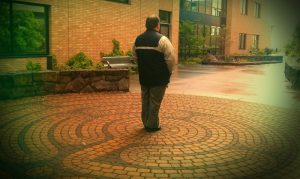
Gil George at the center of the labyrinth
Yesterday I wrote Meditation Monday – Questions from a Labyrinth. about the labyrinth I have been using during Lent and the inspiration it has given me. Many readers responded with comments about their own labyrinths and the enrichment they had given to their prayers. One uses the labyrinth in his local coffee shop, another has one on her shoulder and another reader creates quilted labyrinths.
A few days later, Shelby Selvidge contributed this post: Nature as A Living Labyrinth with a lot more positive feedback.
These comments reminded me of some of the previous blog posts on labyrinths that others have contributed to this blog.
Gil George wrote this beautiful labyrinth prayer while visiting his wife in hospital a few years ago. I particularly love the lines:
I walk towards and away from the center as I follow
A path laid out by someone else, a path walked by others.
Kim Balke wrote this powerful reflection after a workshop with a doula (birth attendant). Her comment at the end is worthy of much reflection:
Every journey is special! What does that mean? Even though birthing is a well trodden path, each woman’s experience is her own- a one of a kind strength, a pure whole note carried on the wind, a sound only she can make, moving on into hello.
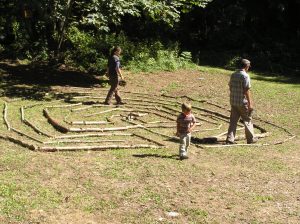
Celtic labyrinth
My own favourite is the labyrinth that we make out of branches at our Celtic retreat on Camano Island. We place a Celtic cross at the centre and adults and kids alike love to walk it. We also often provide templates for people to make their own labyrinths.
And for more information about labyrinths and possible ways to walk them check out this post.
In this post Brenda Warren links to a number of resources about labyrinths.
And last but certainly not least check out this neighbourhood listening walk which has a labyrinth flavour to it.
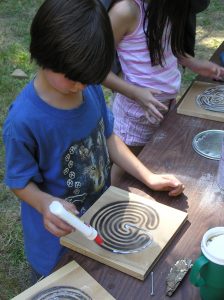
Kids making labyrinths
What are your experiences of labyrinths and how have they enriched your life?
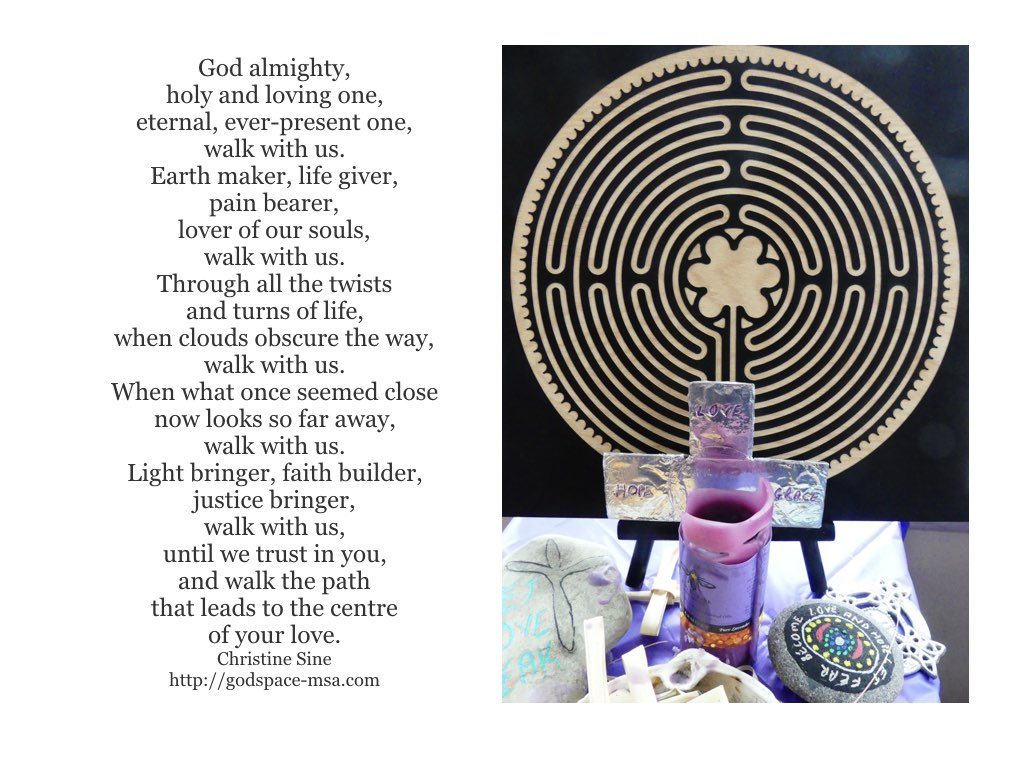
by Christine Sine
Some of you have probably noticed that my finger labyrinth features prominently on my Lenten altar this year. It is an 11 circuit Chartres style labyrinth, so named because it is modeled after the labyrinth set in the stone floor in the nave of Chartres Cathedral in France. Throughout the season this labyrinth has sat on a stand on my prayer table, prominently displayed and ready to be taken down and used whenever I am puzzling over a challenging question. I used it to guide me through the questioning process I described in this Monday meditation. It is comforting, at times challenging but always enlightening.
To be honest when I first read about finger labyrinths when I was working on my book Return to Our Senses, this seemed a very strange way to pray. Most of the articles I read suggested that the best way to trace out a finger labyrinth is with a finger from your non-dominant hand. It seemed weird but evidently research suggests that our non-dominant hand has better access to our intuition.
Much to my surprise, I found that it really did help me focus and often brought intuitive inspiration when I was grappling with challenging questions. As I “walk” my labyrinth I still often recite the prayer above which is one I adapted from a previous one I wrote for Return to Our Senses.
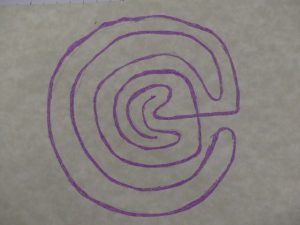
This week I have gone a little further and allowed the labyrinth to inspire my journalling and my preparation for Holy week and Easter. I sketched the crude labyrinth in my journal then wrote the words that have been impressed on me over the last few weeks as a pathway for me to follow as Lent ends. Out of this I suspect will come a new practice for the coming season of Easter.
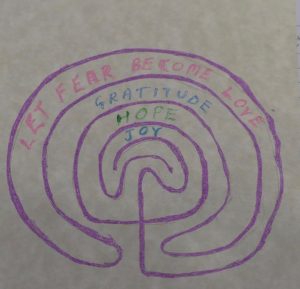
Labyrinths as Pilgrimage
Labyrinths are one of the oldest spiritual tools known to humankind, dating back at least 4000 years. They became identified with the Christian church in Europe around 350 A.D. In the Middle Ages, it is believed that walking the labyrinth was often used as a form of pilgrimage for those who could not afford the time or the money to leave their homes for an extended time to walk to the Holy Land. They walked the labyrinth with the same intentionality that pilgrims did. The inward walk was a journey toward a closer sense of the presence of God, the outward walk, a journey back into the community, taking the benefits of the walk into the ongoing journey of our lives.
In its simplest form a labyrinth walk is used as a simple form of meditation for individuals and groups. Because it requires no figuring out, one can simply walk, allow the mind to quiet, and let the body take over. We may walk, dance, or crawl the path, doing what the body calls forth; there are no rules, there is no right or wrong way.
Many churches and religious institutions, including Calvin College I know encourage their congregations and students to walk the labyrinth during Lent and Holy Week as a meditative walk toward the Cross – an alternative to Stations of the Cross for many people. Here are some ideas on how to do this and pilgrim paths in the U.K. has produced this excellent brochure for a Holy Week labyrinth walk.
Finger Labyrinths for Questioning.
A finger labyrinth is similar to a full sized labyrinth you would walk except it is on a much smaller and more portable scale. The user traces the path to the centre using your finger rather than with their feet. There are many different kinds of labyrinths differing in size and complexity. Interestingly, some of the earliest labyrinths found in Christian churches are finger labyrinths, their circuits well worn over the centuries by the passage of innumerable fingers “walking” to the center and then out again.
While modern hospitals and nursing homes now advertise large and visible outdoor labyrinths, many more healing institutions are quietly bringing finger labyrinths inside. One simple reason is that many patients are confined to beds or wheelchairs. Finger labyrinths have advantages beyond convenience and accessibility. People use finger walks not just for prayer and healing, but also to get ready for meetings, break through writer’s block, cure insomnia, and for many other reasons known only to them. They provide a legitimate path for questioning and problem solving.
I love finger labyrinths – both walking and creating them and would heartily recommend them to you. They are great because of their portability. I even have one I can carry in my pocket. There are many patterns to these so you might like to download a few and experiment with how they can help you find solutions to the questions you are grappling with you. You might just like to color your labyrinth in different colors or write the words that come to you as you walk it along the pathway.
If you have time, create your own finger labyrinth, this is a meditative exercise in itself. Part of what I love is that we can create labyrinths using whatever art medium inspires us. Here are instructions on creating a simple labyrinth, a very inspiring practice I often use in workshops.
One of my favourite set of instructions for making a finger labyrinth is from Heather Plett who has made labyrinth design a piece of art. Other method I have not tried yet is making a finger labyrinth with play dough or out of fabric. Or you might like to use this method which uses yarn, tissue paper and glue to create a very beautiful decorated labyrinth. A fun activity with kids. Alternatively, try knitting a labyrinth . There are lots of patterns out there for knitting. Here is another that looks intriguing.
What Is Your Response?
Walking labyrinths is a great distresser and finger labyrinths can be very therapeutic.
Here is a simple finger labyrinth exercise you might like to experiment with. If you don’t own a finger labyrinth, download or draw a simple pattern.
Sit in a quiet place with your hands in your lap, palms facing upward. Take a few breaths in and out until you feel at peace in your soul.
Recite the prayer above several times and relax into the presence of God
Form a question you are grappling with or use the one I suggested during Lent What am I afraid of? Place a finger from your non-dominant hand at the entrance to the labyrinth. Prayerfully ask your question. Invite the holy spirit of God to guide and instruct you on your journey.
Trace the circuit with your finger. Stay open to whatever presents itself: feelings, sensations, memories, ideas. Pause at any time to breathe, focus on a thought or memory or just to relax into the labyrinth and your questioning. At the center of the labyrinth, sense your connection to your own center and to the the centering presence of God. Acknowledge the Holy Spirit, the heavenly counselor directing your thoughts and exploration. Relax, prayer, sing. Repeat your question and wait on the Holy Spirit to guide you.
Trace your way out, staying open to whatever comes up for you. Now you might like to change you question to What would I do if I was not afraid? When your walk is done, place both hands on the labyrinth, take some deep breaths in and out, and give thanks to God for whatever you learned and experienced.
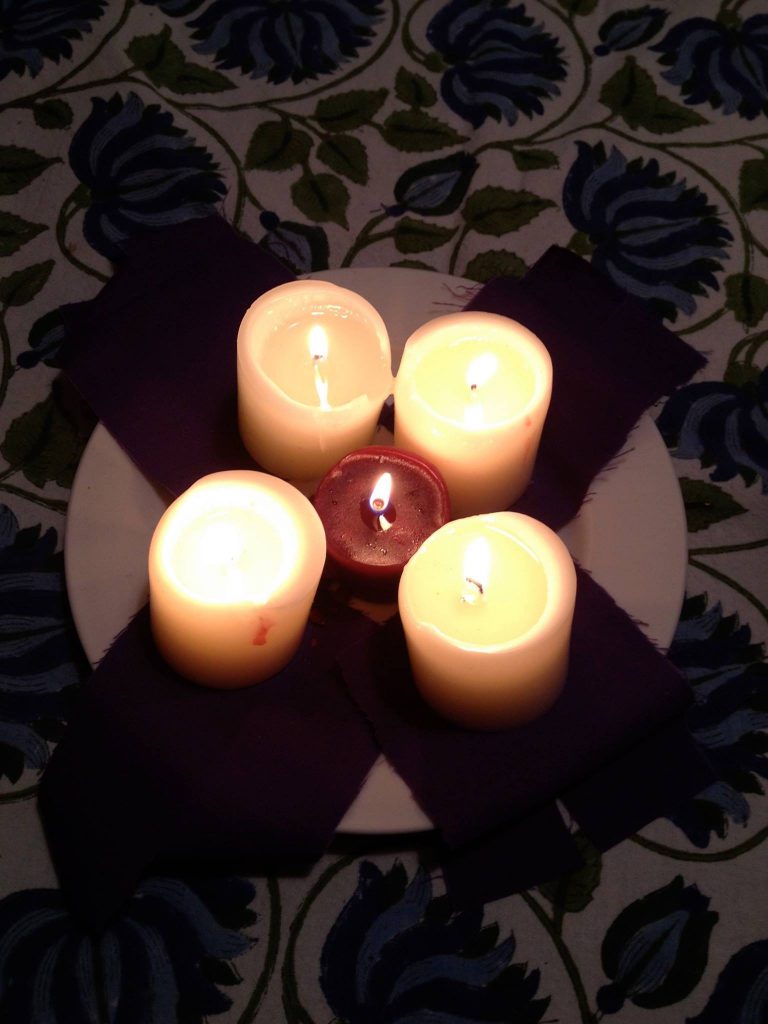
by Lilly Lewin
Freerange Friday is coming even though this first post is a little late!
It’s April 1st and we have fifteen days til Easter Sunday!
So for me it’s a great time to re-start Lent and re-boot my Lenten practice!
Maybe you started on Ash Wednesday and you’ve been doing great with your Lenten practices and/or your Lenten fasting. This year I haven’t been very consistent with either one.
So hooray for April 1st and the start of a new month!
I believe in lots of grace so it’s never to late to start a practice or to decide to do something that draws us closer to God. I see Lent as an opportunity to fall more in love with Jesus on our way to Easter Sunday, a lesson I learned from Fr. Edward Hays.
One of my Lenten practices this year was to start writing again, or put it another way, I was going to “give up” not writing for Lent!
Well sadly this didn’t happen, but during our visit last week, my friend Christine Sine suggested I start Freerange Friday.
So it’s Friday and here it goes, some freerange worship ideas for you to do as you make your way towards Easter and maybe a re-boot of Lent!
First a little background. Holy Week begins on April 9th (this year ) with Palm Sunday and the days leading up to Easter on April 16th All the worship gatherings of Holy Week are used to re-tell the story of the last week in Jesus’ life. Often on Palm Sunday in many churches you get the entire Holy Week story because we figure people are sadly too busy to come back to church during the week. But too often we cram too much into one day and we miss the process of re-telling and remembering the story of Jesus on his way to Jerusalem, on his way to the cross.
I believe we can and need to remember the story and we can all do this right in our homes. Here are three different things you can do to engage Jesus on his way to the cross and ultimately the empty tomb. The first is rather simple, the second involves a cup, and the third involves creating a centerpiece to use on your dining table, or on your coffee table. I’d love to hear how it goes. And I’d love you to keep in touch at freerangeworship.com and by emailing me at freerangeworship@gmail.com
LAST WEEK ON EARTH
Get out some paper or your journal. If you like to draw you can get out your pencils or crayons etc. and draw in response to these questions. You can do this on your own, or with your family, with your roommates, your small group or even with your whole church community or youth group.
This is actually the first prayer station found in my “journey to the cross” prayer experience.
LAST WEEK ON EARTH….Consider Jesus as he makes his way to Jerusalem and then consider what you would do if it was your last week on planet earth.
What if you knew it was your last week on earth? How would you feel? Where would you be? Who would you want to spend the week hanging out with? Would you do anything differently? Why or Why not?
How would you want to spend your last days on Earth? Write about this and then if you are doing this with other people you might give them the opportunity to share what they wrote.
A second part of this experience would be to create a post card or poster of where you’d like to spend your last week on Earth.
You can keep this experience going by reading a bit of the story of Jesus’s last week on earth in your bible or on you phone with a bible app like Bible Gateway. What were the ways Jesus spent his last week on Earth? Did he change anything? What do you learn about Jesus during this week?
Praying with your Cup.
The second idea is something you can do on your own using your coffee cup, red solo cup, your Starbucks cup or your tea cup each day. Check this out in the article I wrote for youth specialties.
Create a Holy Week Centerpiece.
Finally, you can create a centerpiece to use in the next two weeks on your way to Easter. You can do this on your own, with your family, with your kids, roommates and even with your whole church community. This is long because it has all the supplies you will need and the meditation and activity to use with each day. Check out this blog post and I can also send you a pdf if you’d like to have one to print out.

Rebecca Baxer —
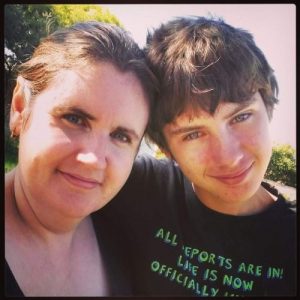 Going on 18 years ago a gorgeous baby boy was about to be born. The second of my children at that stage of my life, he was anticipated. Loved. Much dreamed about. All the questions that came up as I discovered I was pregnant again, then that he was a boy, a big boy. What would life be like as a mum of 2 little people under the age of 18 months old?! How would I cope? What would his birth be like?
Going on 18 years ago a gorgeous baby boy was about to be born. The second of my children at that stage of my life, he was anticipated. Loved. Much dreamed about. All the questions that came up as I discovered I was pregnant again, then that he was a boy, a big boy. What would life be like as a mum of 2 little people under the age of 18 months old?! How would I cope? What would his birth be like?
I had lots of thoughts and emotions rushing around in my heart and my head. I felt reasonably confident in my ability to do this. Nervous and excited all rolled into one. If you have ever been blessed to be a parent then you’ll know.
What I didn’t know was that my little guy would spend the better part of 2 years screaming every time he was put into water. Bath times were breaking this mum’s heart. What I didn’t know was that my little guy would struggle to meet the eyes of people, including me. That for years he would barely ever smile. That he would take years to use the words we take for granted, to be able to express his internal frustration at not being able to process the world around him the same way neurotypical people would.
What I didn’t know for years was that my gorgeous little man would eventually be diagnosed with Autism. And with that word came great grief and great relief all bundled into an emotion charged flurry of activity. I had to learn. I had to understand. I had to work through my feelings of guilt, of anger, of sorrow…I had to help family understand him. To organise early intervention to help him. But one thing I didn’t have to learn was to LOVE him.
This precious little guy was and is so loved. I watched him thrive as he discovered his unique abilities. He was determined, focused, and boy did he have a story to tell. He was changing people’s hearts one interaction at a time.
Today that little guy is a 17 year old young man. He loves to help people. Just ask any of his church family. He will be one of the first to volunteer his strong arms and willing back. His well – practiced smile is such a delight to see, and would melt the hardest of hearts. His enthusiasm for life is just the type of reminder I so regularly need. And if you ask that young athlete to run something from one side of our country town to the other he will be off in a flash, as though my boy-man has wings on his feet, joy in his heart!
Today is Autism awareness day. I don’t know if today is a day of fear for you. A day of frustration, of questions, lack of answers, answers overload, anxiety, grief, thanksgiving. But what I do know is this.
You are not alone
Friends and strangers have walked, limped, cried, run, crashed, laughed, picked themselves up, tried again, and again and again, to traverse this path. Some have done it before you. And they’ll do it behind and beside you too.
If I have learnt anything from the last 17 plus years it is this: we don’t need to be afraid to invite others to do this journey with us. Because then we can hope, laugh, cry and inspire TOGETHER. And as we include God as part of that rollercoaster of a journey, Hope and Love are just that little bit easier.
LOVE is a great teacher. It helps us to pursue understanding, kindness, gentleness, self-control. To have Joy filled hearts. To exhibit patience. To make a choice daily to walk beside the people who challenge our perceptions. Who may show us a mirror of our attitudes and potentially bring so many challenges into our lives. Who get us thinking outside the box, and expand the way we understand the world.
So here’s to all the out of the box people! Let LOVE be a catalyst for changing attitudes. For deeper desire to understand. And for sharing our lives with vulnerability, grace, and a double dose of enthusiasm! Let’s all #loveourautisticneighbour
 Sunday, April 2nd, is Autism Awareness Day and the entire month is Autism Awareness Month
Sunday, April 2nd, is Autism Awareness Day and the entire month is Autism Awareness Month
As an Amazon Associate, I receive a small amount for purchases made through appropriate links.
Thank you for supporting Godspace in this way.
When referencing or quoting Godspace Light, please be sure to include the Author (Christine Sine unless otherwise noted), the Title of the article or resource, the Source link where appropriate, and ©Godspacelight.com. Thank you!



